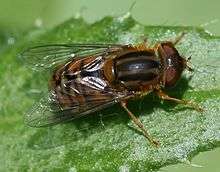Parhelophilus versicolor
Parhelophilus versicolor is a European hoverfly.[1][2]
| Parhelophilus versicolor | |
|---|---|
 | |
| Scientific classification | |
| Kingdom: | |
| Phylum: | |
| Class: | |
| Order: | |
| Family: | |
| Subfamily: | |
| Tribe: | |
| Genus: | |
| Species: | P. versicolor |
| Binomial name | |
| Parhelophilus versicolor Fabricius, 1787 | |
Description
External images
For terms see Morphology of Diptera
Wing length is 7–9 mm. There is no posteroventral tubercle at base of Femur 3. Face is convex. Occiput has yellow hairs only. Reemer (2000) figures the male genitalia.[3] The larva is figured by Hartley (1961) [4]
See references for determination.[5][6][7][8]
Distribution
Palearctic Southern Fennoscandia South to Iberia and the Mediterranean basin. Ireland East through Europe into Turkey and European Russia then to western Siberia.[9][10]
Biology
Habitat: Wetland. Fen, marsh and reed beds.[11] Flowers visited include white umbellifers, Aegopodium podagraria, Cardamine, Cistus, Crataegus, Euphorbia, Filipendula ulmaria, Galium, Leontodon, Sorbus aucuparia.[12] Flies May to August. The larvae is aquatic. It has been collected from decaying rhizomes of Typha.
References
- Stubbs, Alan E.; Falk, Steven J (1983). British Hoverflies: An Illustrated Identification Guide (2nd ed.). London: British Entomological and Natural History Society. pp. 253, xvpp. ISBN 1-899935-03-7.
- Ball, S.G.; Morris, R.K.A. (2000). Provisional atlas of British hoverflies (Diptera, Syrphidae). Monks Wood, UK: Biological Record Centre. pp. 167 pages. ISBN 1-870393-54-6.
- Reemer, M. (2000) A new species of Parhelophilus Girschner, 1897 (Diptera, Syrphidae) from southwestern Europe. Dipteron, 3: 1-6.
- Hartley, J.C. (1961) A taxonomic account of the larvae of some British Syrphidae. Proc.zool.Soc.Lond.,136: 505-573.
- Van Veen, M. (2004) Hoverflies of Northwest Europe: identification keys to the Syrphidae. 256pp. KNNV Publishing, Utrecht.addendum
- Van der Goot,V.S. (1981) De zweefvliegen van Noordwest - Europa en Europees Rusland, in het bijzonder van de Benelux. KNNV, Uitgave no.32: 275pp. Amsterdam.
- Bei-Bienko, G.Y. & Steyskal, G.C. (1988) Keys to the Insects of the European Part of the USSR, Volume V: Diptera and Siphonaptera, Part I. Amerind Publishing Co., New Delhi. ISBN 81-205-0080-6.
- Coe, R.L. (1953) Diptera: Syrphidae. Handbks.ident.Br.insects, 10(1): 1-98. R.ent.Soc.London. pdf
- Fauna Europaea
- Peck, L.V. (1988) Syrphidae. In: Soos, A. & Papp, L. (eds.) Catalogue of Palaearctic Diptera, 8: 11-230. Akad.Kiado, Budapest.
- Speight, M.C.D. (2011). "Species accounts of European Syrphidae (Diptera)" (PDF). Syrph the Net, the database of European Syrphidae. 65: 285pp.
- de Buck, N. (1990) Bloembezoek en bestuivingsecologie van Zweefvliegen (Diptera, Syrphidae) in het bijzonder voor België. Doc.Trav. IRSNB, no.60, 1-167.